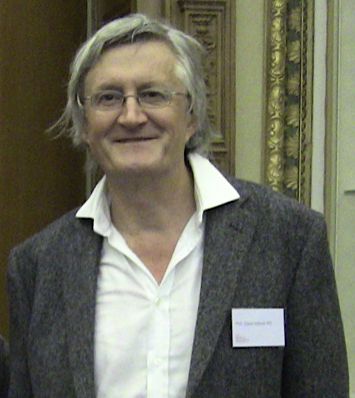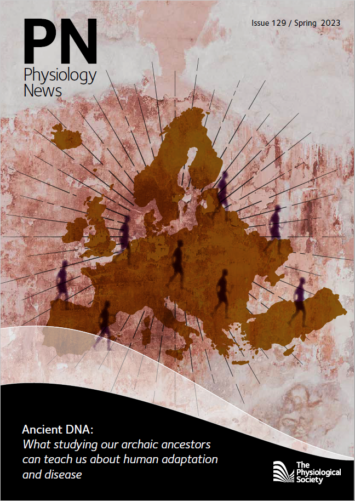
Physiology News Magazine
Why become President of The Physiological Society?
Guest Editorial and President’s View
Introduction
Why become President of The Physiological Society?
Guest Editorial and President’s View
Introduction

Professor David Attwell
President, The Physiological Society
As I step into the shoes of David Paterson, to be President of the Society for the next two years, it seems appropriate to give those of you who have never heard of me some background information on who I am, explain why I agreed to do this job, and state what I see as the challenges ahead for The Society.
I started undergraduate life as a physicist at Oxford but, on seeking a subject to do research in, for a PhD, was seduced into biophysics and electrophysiology, largely because all my friends doing physiology and medicine seemed much happier with their choice than those doing physics! I was fortunate to find an outstanding PhD supervisor (Julian Jack) who was willing to take a bet on a biology-naive physicist, and a very patient college tutor (John Stein) willing to mentor me through the transition to a rapidly acquired degree in Physiological Sciences. Following my PhD, which was on nerve and cardiac electrophysiology in the labs of Julian Jack and Denis Noble, I did a post-doc in Berkeley working on the retina with Frank Werblin and Martin Wilson, before taking up a lectureship at University College London, where I still work. Since arriving at UCL I have been lucky enough to study a broad range of topics including retinal information processing, astrocyte biology, glutamate transporters, oligodendrocytes and myelination, cardiac and renal physiology, brain energetics, and control of blood flow in the brain at the capillary level, so I can reasonably claim to represent a broad swathe of physiologists.
From my earliest research years, The Physiological Society played a very important role as a venue at which one should aspire to present work and get feedback from others, despite (in those days) the associated “public viva” at the end of each 10 minute talk (including tiresome discussions of the punctuation in the abstract!) that almost inevitably led to a decision to accept the abstract for publication – except on those rare and terrifying occasions when the audience took against the speaker. It was experiencing the very positive aspects of participating in The Society that led me to accept to be its President for the next two years. The irrepressibly optimistic David Paterson is going to be a hard act to follow, and The Society has some serious challenges ahead, which I will dwell on below. But before that I thought it useful to assess the current state and likely future of physiology as a discipline, and how better to do that than to ask the new fashionable AI tool, ChatGPT, which has apparently digested (and can regurgitate) most text written up until 2021.
In response to the question: “What is the future of Physiology as a discipline?”, ChatGPT replied (in about 3 seconds!) as follows.
Physiology is a broad and rapidly-evolving field that encompasses the study of the functions and mechanisms of living organisms. The future of physiology is likely to be shaped by advances in technology and new research discoveries. Some areas that may see significant growth in the future include: Systems Physiology; Precision Medicine; Neuroscience; Environmental Physiology; Biotechnology and Regenerative Medicine; Artificial Intelligence and Machin Learning. Overall, the future of physiology looks promising, with many new technologies and discoveries expected to shape the field and lead to new treatments and therapies for a wide range of diseases.
On starting as the new President, I greatly welcome this positive view, which even overlaps in part with The Society’s strategy, but we need to be aware of some clouds on the horizon for our – and many other – learned societies. While, classically, it is traditional to talk of the fragmentation of disciplines into sub disciplines, which then form their own societies, as a major risk to the future of learned societies, our current main problem stems from a much simpler cause: the move to Open Access publishing.
The Society is committed to the principles of the Open Science movement and at the start of this year we celebrated the occasion when Experimental Physiology became Open Access. Both authors and readers of the journal will benefit from this historic change and it represents a fantastic opportunity for research in Experimental Physiology to reach as wide an audience as possible.
Open Access publishing seeks to democratise and expand science by ensuring unfettered access to critical research to a whole scientific community without the restriction of a paywall. But the transition to a fully Open Access world is not necessarily a straightforward change to navigate, and the idea of a democratised scientific publishing landscape is not so easily achieved when the challenge of covering the cost of publication without penalising authors or readers remains.
From The Physiological Society’s point of view, the main issue is that if, in the future, The Journal of Physiology is required to move to an Open Access model of publishing, then the journal will need to adapt to enable that change whilst ensuring that any income to support The Society’s charitable aims, as has existed in the past, can be maintained. To protect The Society’s income, we will need to publish more papers, either in the same journals (whilst balancing the focus on quality that the journals are renowned for) or in new journals, which will need to be carefully conceived to complement our existing portfolio of journals. Unlike some other societies, we have little endowment to raise income, so it would be desirable to develop extra income streams to ensure that we can maintain our core business of organising great meetings and publishing high-quality journals, while sustaining our Equity, Diversity and Inclusion plans and our engagement aims.
With all this in mind, I have been immensely impressed by the quality of The Society’s staff and trustees and how they are addressing these issues. As we all know, physiology can Change the World, and the new Strategy for The Society sets out a clear plan for the next five years. We have excellent Journals to publish in, and there are some great Meetings coming up, including our flagship annual meeting Physiology 2023 in Harrogate. I look forward to meeting you in person at a meeting or, if that is not possible, do feel free to write to me to express your opinion on any Society-related matter.
